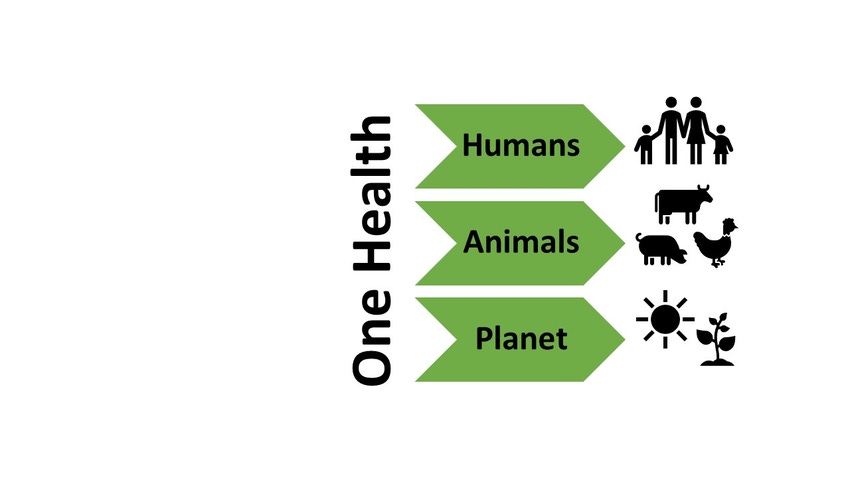Global ‘One Health’ collaboration efforts have critical roles to play in addressing transboundary and zoonotic diseases at all levels.
February 14, 2020

Emerging diseases are challenging the global public health systems and food security needs today. Diseases, some that are transboundary, some that are zoonotic, and some that are both transboundary and zoonotic, are testing our global approaches. A proactive collaborative ‘One Health’ approach has never been more important.
Ponder the impacts of the 2019 novel coronavirus (2019-nCoV or newly name COVID-19, the CO stands for corona, the VI for virus, the D for disease and 19 for the year 2019) and African swine fever (ASF), each uniquely different from each other and currently being addressed globally. Each requiring a coordinated global effort whether at the local, national, regional or global level. Each requiring a collaborative public and private sector partnership. Each drawing upon the role of international intergovernmental organizations, such as WHO (World Health Organization), FAO (Food & Agriculture Organization) or OIE (World Organization for Animal Health). Each requiring a ‘One Health’ mindset!
Importantly for understanding, ASF is a transboundary and not a zoonotic disease, and COVID-19 is a transboundary and a zoonotic disease. ASF is a viral animal disease affecting pigs with up to 100% case fatality and is broadly spreading in Asia, and less so in Africa, Eastern Europe and into Western Europe. COVID-19 is a disease, a respiratory illness, caused by a novel (new) coronavirus discovered in 2019 in a zoonotic outbreak starting in Wuhan City, Hubei Province, China.
Today’s 7.75 billion people are more connected than ever before through global travel, trade and information networks. The traditional barriers of connectivity -- oceans, mountains and distance -- have vanished with modern transportation modes. Communication gaps have evaporated with the internet and mobile technology.
Yet, nature remains all powerful and unfortunately diseases and pathogens are adaptive – the basic biology of survival of the fittest. Travel and trade, along with integrated global networks and systems, can provide for the accelerated transfer of risks. Thus, how can we more rapidly identify the risks, specifically the highest public health and food security risks, and accelerate interventions to eliminate or minimize the risks? Collaboration and a coordinated ‘One Health’ effort are key!
Observing the evolving aspects around COVID-19 and ASF, a few key points come to mind. First, calm, reason and facts need to displace any panic, speculation or myths. Second, factual information, via monitoring and surveillance efforts, needs to be captured and shared in real time. Data points need to be comparable, or when the basis changes such should be duly noted. Third, experts need to quickly work toward advancement of a basic scientific understanding and analysis of the disease or pathogen – such as its diagnosis, origination source, genome sequence, adaptations, transmission modes and mechanisms, virulence, controls, treatments and cures.
Scenario planning, issue preparedness and crisis management each have their role as companies, organizations and governments address today’s business and health risks. Anyone that has addressed a ‘crisis’ knows that early information is often limited, imperfect and incomplete. Determined efforts need to be made to gather full and accurate information for the most informed decision making. Actions may need to be taken based on the early information, but refinements will need to be made as more complete information is gathered. Openness, transparency and communication are key to inform and guide actions. Full business risks will need to be considered and determined as more complete information is gathered and assessed.
In dealing with COVID-19 and ASF, there is an ongoing issue cycle, a disease or pathogen cycle, and one must recognize such. The key is to understand there will be a full cycle and thus the likely need to adjust accordingly. Today, these cycles are still in process, so this is real life for all.
The combined impacts of COVID-19 from a public health perspective and ASF from a food security perspective are yet to be fully realized recognizing their evolving status. Disruption is the likely near-term impact as efforts are made to control the spread of COVID-19 and ASF. This disruption will come in many forms regarding supply chains, production capabilities and consumption patterns. Watching morbidity and mortality numbers will help understand the evolving disease and issue cycle. Interventions and preventive practices, and biosecurity and quarantine measures, each will be key in controlling disease spread and minimizing risks.
Trade and commerce continuity are needed for both public health as well as food security purposes. Governments need to determine the appropriate levels of protection necessary to protect human and animal health while also seeking to facilitate trade to meet public health and food security needs.
Recognizing there are limited current resources - human and financial - efforts need to be prioritized in addressing COVID-19 and ASF. It is also timely to be assessing our current systems and resources both from a public sector and a private sector perspective. Assessing and noting the strengths and weaknesses of our current systems and processes now during the issues cycle can allow for adjustments in the future when doing a post analysis and making adjusting for future best practices.
Initial learnings from ASF show the potential devasting effects of one disease, due to swine mortality, on global food security. The impact on the domestic food supply and the global food supply are significant. The disease impacts range from those on input suppliers, to farm production practices, transportation, food processing, food distribution and trade flows. Initial learnings from COVID-19 include that people movement nationally and globally are high risk transmission modes. The ability to diagnose quickly, pinpoint the incubation period, control spread via people movement and maintain basic supply chains are challenges.
At a high level when viewing COVID-19 and ASF, risk and biosecurity become key aspects. Globally, regionally, nationally and locally, how do we better identify the highest risks areas or practices? How do we enhance monitoring and biosecurity measures to identify and eliminate the highest risks? For each fortunately we can learn from the past, but also, we need to think how do we accelerate change and elimination of the highest risks?
Global ‘One Health’ collaboration efforts need to be accelerated amongst governments and the private sector. Both have critical roles to play in addressing transboundary and zoonotic diseases at the local, national, regional and global levels. Our public health and food security will be determined by our ability to work together for the betterment of all globally, in our globally interconnected and reliant world.
About the Author(s)
You May Also Like




.png?width=300&auto=webp&quality=80&disable=upscale)
